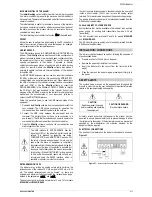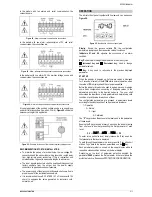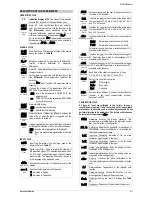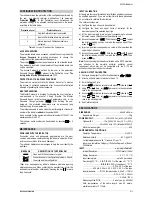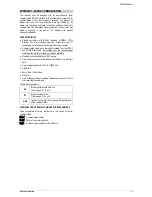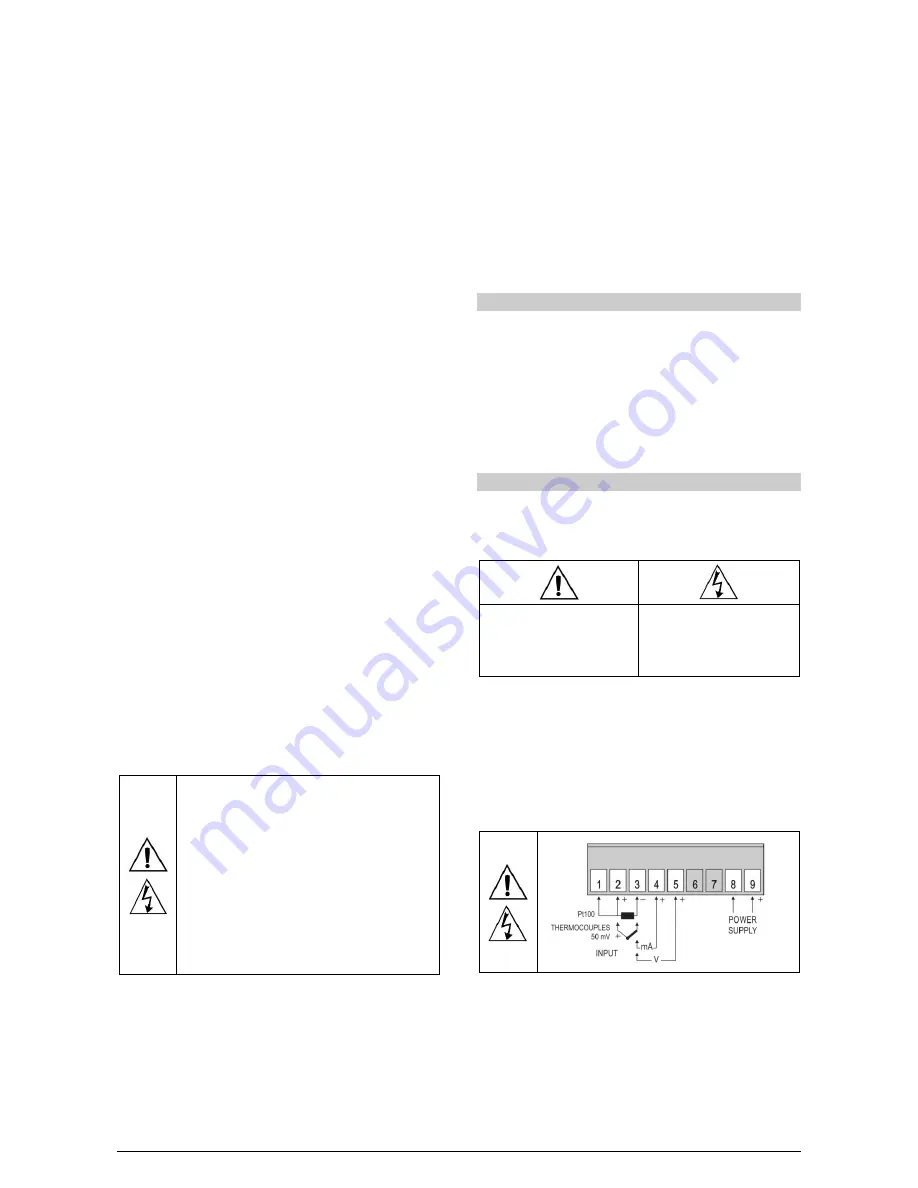
N1040i Indicator
NOVUS AUTOMATION
2/7
BLOCKING INITIAL OF THE ALARM
The
initial
blocking
option inhibits the alarm from being recognized
if an alarm condition is present in the process when the indicator is
first energized. The alarm will be enabled only after the occurrence of
no alarm condition.
The initial blocking is useful, for example, when one of the alarms is
set up as a minimum value alarm, which may cause the activation of
the alarm soon upon the process start-up; an occurrence that may
undesirable in many cases.
The initial blocking is not valid for the function
ierr
(Sensor Break).
OFFSET
Allows the user to perform fine adjustments to the PV indication. It
allows the correction of measuring errors that appear, for example,
on the replacement of the temperature sensor.
USB INTERFACE
The USB interface is used for CONFIGURING or MONITORING the
indicator. The
NConfig
software must be used for the configuration. It
makes it possible to create, view, save and open configurations from
the equipment or files in your computer. The tool for saving and
opening configurations in files makes it possible to transfer
configurations between pieces of equipment and to make backup
copies. For specific models, the
NConfig
software also makes it
possible to update the firmware (internal software) of the indicator
through the USB.
For MONITORING purposes you can use any supervisory software
(SCADA) or laboratory software that supports the MODBUS RTU
communication on a serial communications port. When connected to
the USB of a computer, the indicator is recognized as a conventional
serial port (COM x). Use the
NConfig
software or consult the
DEVICE MANAGER in the Windows CONTROL PANEL to identify
the COM port that was assigned to the indicator. Consult the
mapping of the MODBUS memory in the indicator’s communications
manual and the documentation of your supervisory software to
conduct the MONITORING process.
Follow the procedure below to use the USB communication of the
equipment:
1.
Download the
NConfig
software from our website and install it on
your computer. The USB drivers necessary for operating the
communication will be installed together with the software.
2.
Connect the USB cable between the equipment and the
computer. The indicator does not have to be connected to a
power supply. The USB will provide enough power to operate the
communication (other equipment functions cannot operate).
3.
Open the
NConfig
software, configure the communication and
start recognition of the device.
The USB interface IS NOT SEPARATE from the
signal input (PV) or the indicator’s digital inputs and
outputs. It is intended for temporary use during
CONFIGURATION and MONITORING periods. For
the safety of people and equipment, it must only be
used when the piece of equipment is completely
disconnected from the input/output signals. Using the
USB in any other type of connection is possible but
requires a careful analysis by the person responsible
for installing it. When MONITORING for long periods
of time and with connected inputs and outputs, we
recommend using the RS485 interface, which is
available or optional in most of our products.
RETRANSMISSION OF PV
The indicator may include an analog output which performs the
retransmission of the values of PV into a signal of 0-20 mA or 4-20
mA. The analog retransmission can be scaled, i.e., there are
minimum and maximum limits to establish the retransmission range,
defined in the parameters
“
rtLL
”
and
“
rtkL
”
.
The analog output is available on terminals 13 and 14 for models
N1040i-RA
and
N1040i-RA-485
.
In order to obtain retransmission in electrical voltage, the user shall
install a
shunt
resistor (500
max.) across the analog output
terminals. This resistor value depends on the desired voltage range.
The analog retransmission output is not electrically isolated from the
RS485 serial communication.
24 Vdc AUXILIARY VOLTAGE SOURCE
Another feature that may be available in the indicator is an auxiliary
power supply for exciting field transmitters (two-wire 4-20 mA
transmitters).
The 24 Vdc output is on terminals 13 and 14 for models
N1040i-RE
and
N1040i-RE-485
.
The 24 V auxiliary power supply is not electrically isolated from the
RS485 serial communication.
INSTALLATION / CONNECTIONS
The indicator shall be fastened on a panel, following the sequence of
steps described below:
Prepare a cut-out of 46 x 46 mm on the panel;
Remove the mounting clamp from the indicator;
Insert the indicator into the cut-out from the front side of the
panel;
Place the clamp on the indicator again, pressing until firm grip to
the panel.
SAFETY ALERTS
The symbols below are used on the equipment and throughout this
manual in order to draw the user´s attention to important information
related to the equipment safety and operation.
CAUTION:
Read the manual thoroughly
before installing and operating
the equipment
CAUTION OR DANGER:
Electrical shock hazard
All safety related instructions that appear in the manual must be
observed to ensure personal safety and to prevent damage to either
the instrument or the system. If the instrument is used in a manner not
specified by the manufacturer, the protection provided by the
equipment may be impaired.
ELECTRICAL CONNECTIONS
The position of the features on the indicator back panel is shown on
Figure 01
:
Figure 01
– Inputs connections and power supply


